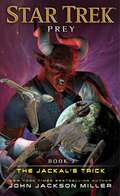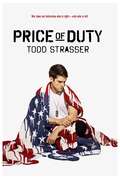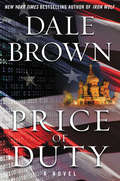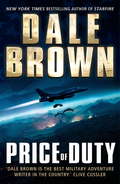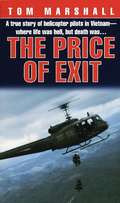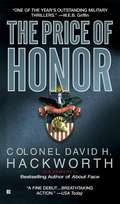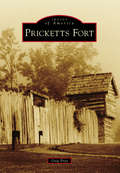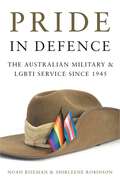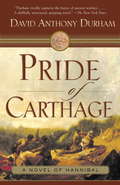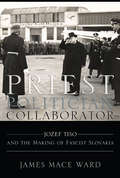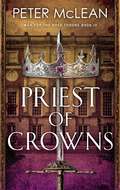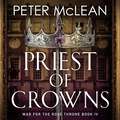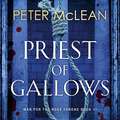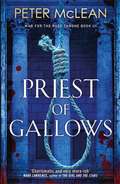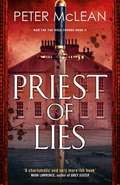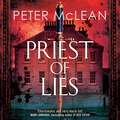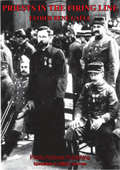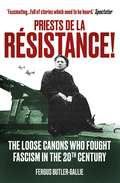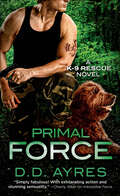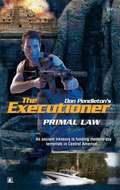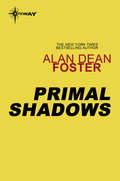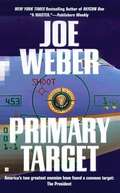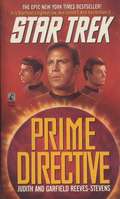- Table View
- List View
Prey: The Jackal's Trick (Star Trek)
by John Jackson MillerContinuing the milestone 50th anniversary celebration of Star Trek—an epic new trilogy that stretches from the events of The Original Series movie The Search for Spock to The Next Generation!The Klingon-Federation alliance is in peril as never before. Lord Korgh has seized control of the House of Kruge, executing a plot one hundred years in the making. The Klingon cult known as the Unsung rampages across the stars, striking from the shadows in their cloaked Birds-of-Prey. And the mysterious figure known as Buxtus Cross launches a scheme that will transform the Klingon Empire forever. Into danger flies Admiral William T. Riker and the USS Titan, charged with protecting the peace forged nearly a century before during the Khitomer Accords. Aided by Captain Jean-Luc Picard and the USS Enterprise, Riker and his officers scour the stars, seeking to find the Unsung and uncover the truth behind the conspiracy before time runs out. Yet even as Commander Worf departs on a deeply personal mission of honor, hidden sinister forces seek to turn the crisis to their advantage. And the conspirators’ plans threaten to spiral out of control, jeopardizing the very empire they aspire to rule.
Price of Duty
by Todd Strasser<p>From award-winning author Todd Strasser comes a gripping novel that explores the struggles of war, the price paid by those who fight in them, and what it really means to be a hero. <p>Jake Liddell is a hero. <p>At least, that’s what everyone says he is. The military is even awarding him a Silver Star for his heroic achievements—a huge honor for the son of a military family. Now he’s home, recovering from an injury, but it seems the war has followed him back. He needs pills in order to sleep, a young woman is trying to persuade him into speaking out against military recruitment tactics, and his grandfather is already urging him back onto the battlefield. He doesn’t know what to do; nothing makes sense anymore. <p>There is only one thing that Jake knows for certain: he is no hero.</p>
Price of Duty: A Novel (Patrick McLanahan)
by Dale BrownThe U.S. and its Western allies come under a diabolical Russian cyber warfare attack in this action-packed military techno-thriller from New York Times bestselling master Dale Brown.In a top-secret location deep in the Ural Mountains, Russian President Gennadiy Gryzlov has built his nation’s most dangerous weapon since the atomic bomb—a fearsome tool to gain superiority in Russia’s long-running battle with the West. From inside Perun Aerie—an intricate network of underground tunnels and chambers that is the heart of the Russian cyber warfare program—he is launching a carefully plotted series of attacks on an unsuspecting U.S. and its European allies. The first strike targets Warsaw, Poland, where Russian malware wipes out the records of nearly every Polish bank account, imploding the country’s financial system and panicking the rest of Europe. When Stacy Anne Barbeau, the besieged American president, fails to effectively combat the Russian threat, Brad McLanahan, on some well-earned R&R with his new Polish girlfriend, Major Nadia Rozek, is called back to duty. As the Russians’ deadly tactics escalate—including full-scale assaults on Europe’s power grid and the remote hijacking of a commercial airliner that kills hundreds of civilians—McLanahan and his Scion team kick into gear, arming themselves with the most advanced technological weaponry for the epic struggle ahead. A patriot in the mold of his father, the late general Patrick McLanahan, Brad knows firsthand the price of freedom. With the world’s fate hanging in the balance, will Scion succeed in turning back Gryzlov before he can realize his terrifying ambition to conquer the globe? And what will the toll of victory be?
Price of Duty: A Novel (Patrick Mclanahan Ser.)
by Dale BrownIn a top-secret location deep in the Ural Mountains, Russian President Gennadiy Gryzlov has built his nation's most dangerous weapon since the atomic bomb-a fearsome tool to gain superiority in Russia's long-running battle with the West. From inside Perun Aerie-an intricate network of underground tunnels and chambers that is the heart of the Russian cyber warfare program-he is launching a carefully plotted series of attacks on an unsuspecting U.S. and its European allies.The first strike targets Warsaw, Poland, where Russian malware wipes out the records of nearly every Polish bank account, imploding the country's financial system and panicking the rest of Europe. When Stacy Anne Barbeau, the besieged American president, fails to effectively combat the Russian threat, Brad McLanahan, on some well-earned R&R with his new Polish girlfriend, Major Nadia Rozek, is called back to duty.As the Russians' deadly tactics escalate - including full-scale assaults on Europe's power grid and the remote hijacking of a commercial airliner that kills hundreds of civilians - McLanahan and his Scion team kick into gear, arming themselves with the most advanced technological weaponry for the epic struggle ahead. A patriot in the mold of his father, the late general Patrick McLanahan, Brad knows firsthand the price of freedom.With the world's fate hanging in the balance, will Scion succeed in turning back Gryzlov before he can realize his terrifying ambition to conquer the globe? And what will the toll of victory be?
Price of Exit: A True Story of Helicopter Pilots in Vietnam
by Tom Marshall"The risk of a fatal catastrophe was constant. The NVA was the enemy, but the ultimate opponent was, quite simply, death. . . ."For assault helicopter crews flying in and around the NVA-infested DMZ, the U.S. pullout from Vietnam in 1970-71 was a desperate time of selfless courage. Now former army warrant officer Tom Marshall of the Phoenix, C Company, 158th Aviation Battalion, 101st Airborne, captures the deadly mountain terrain, the long hours flown under enormous stress, the grim determination of hardened pilots combat-assaulting through walls of antiaircraft fire, the pickups amid exploding mortar shells and hails of AK fire, the nerve-racking string extractions of SOG teams from North Vietnam. . . . And, through it all, the rising tension as helicopter pilots and crews are lost at an accelerating pace.It is no coincidence that the Phoenix was one of the most highly decorated assault helicopter units in I Corps. For as the American departure accelerated and the enemy added new, more powerful antiaircraft weapons, the helicopter pilots, crew chiefs, and gunners paid the heavy price of withdrawal in blood. For more than 30 Percent of Tom Marshall's 130 helicopter-school classmates, the price of exit was their lives. . . .From the Paperback edition.
Price of Honor
by David HackworthWith a golden name and a platinum future, U.S. Army Special Forces Captain Sandy Caine was born to soldier. For eight generations, his family has served duty, honor, and country on the battlefield, save one--Sandy's father, who cracked under fire in Vietnam, disgracing the Caine family as a coward. At least, that's what Sandy'd been led to believe. Little does he know that what happened to his father has grown into a thirty-year legacy of silence and deception perpetrated by the most powerful players in Washington. Because in times of war, the first casualty is truth. And Sandy Caine knows that the truth is the only thing that can set him free ... if it doesn't kill him first.
Pricketts Fort (Images of America)
by Greg BrayPricketts Fort was built on the land of Jacob Prickett in 1774, during what is known as Lord Dunmore's War. It provided sanctuary for local settlers before and during the American Revolution and was a safe haven from the attacks of American Indians until the Battle of Fallen Timbers in 1794. Constructed by local militia on a small rise near the confluence of Pricketts Creek and the Monongahela River, Pricketts Fort provided refuge for approximately 80 families. The fort itself was large by 18th-century standards. It had blockhouses at each corner, with walls 12 feet high and 110 feet long. Although the fort was never attacked, many outlying homes were, and a number of settlers lost their lives. Today, Pricketts Fort hosts visitors looking to learn more about day-to-day life on the western Virginian frontier.
Pride in Defence: The Australian Military and LGBTI Service since 1945
by Noah Riseman Shirleene RobinsonSince the Second World War the Australian military has undergone remarkable transformations in the way it has treated lesbian, gay, bisexual, transgender and intersex service members: it has shifted from persecuting, hunting and discharging LGBTI members to embracing them as valued members who enhance the Force's capabilities. LGBTI people have served in the Australian military since its very beginnings, yet Australian Defence Force histories have been very slow to recognise this. Pride in Defence confronts that silence. It charts the changing policies and practices of the ADF, illuminating the experiences of LGBTI members in what was often a hostile institution. Drawing on over 140 interviews and previously unexamined documents, Pride in Defence features accounts of secret romances, police surveillance and traumatic discharges. At its centre are the courageous LGBTI members who served their country in the face of systemic prejudice. In doing so, they showed the power of diversity and challenged the ADF to make it a far stronger institution.
Pride of Carthage
by David Anthony DurhamThis epic retelling of the legendary Carthaginian military leader's assault on the Roman empire begins in Ancient Spain, where Hannibal Barca sets out with tens of thousands of soldiers and 30 elephants. After conquering the Roman city of Saguntum, Hannibal wages his campaign through the outposts of the empire, shrewdly befriending peoples disillusioned by Rome and, with dazzling tactics, outwitting the opponents who believe the land route he has chosen is impossible. Yet Hannibal's armies must take brutal losses as they pass through the Pyrenees mountains, forge the Rhone river, and make a winter crossing of the Alps before descending to the great tests at Cannae and Rome itself. David Anthony Durham draws a brilliant and complex Hannibal out of the scant historical record-sharp, sure-footed, as nimble among rivals as on the battlefield, yet one who misses his family and longs to see his son grow to manhood. Whether portraying the deliberations of a general or the calculations of a common soldier, vast multilayered scenes of battle or moments of introspection when loss seems imminent, Durham brings history alive.
Priest Politician Collaborator: Jozef Tiso and the Making of Fascist Slovakia
by James Mace WardIn Priest, Politician, Collaborator, James Mace Ward offers the first comprehensive and scholarly English-language biography of the Catholic priest and Slovak nationalist Jozef Tiso (1887-1947). The first president of an independent Slovakia, established as a satellite of Nazi Germany, Tiso was ultimately hanged for treason and (in effect) crimes against humanity by a postwar reunified Czechoslovakia. Drawing on extensive archival research, Ward portrays Tiso as a devoutly religious man who came to privilege the maintenance of a Slovak state over all other concerns, helping thus to condemn Slovak Jewry to destruction. Ward, however, refuses to reduce Tiso to a mere opportunist, portraying him also as a man of principle and a victim of international circumstances. This potent mix, combined with an almost epic ability to deny the consequences of his own actions, ultimately led to Tiso's undoing.Tiso began his career as a fervent priest seeking to defend the church and pursue social justice within the Kingdom of Hungary. With the breakup of Austria-Hungary in 1918 and the creation of a Czechoslovak Republic, these missions then fused with a parochial Slovak nationalist agenda, a complex process that is the core narrative of the book. Ward presents the strongest case yet for Tiso's heavy responsibility in the Holocaust, crimes that he investigates as an outcome of the interplay between Tiso's lifelong pattern of collaboration and the murderous international politics of Hitler's Europe. To this day memories of Tiso divide opinion within Slovakia, burdening the country's efforts to come to terms with its own history. As portrayed in this masterful biography, Tiso's life not only illuminates the history of a small state but also supplies a missing piece of the larger puzzle that was interwar and wartime Europe.
Priest of Crowns (War for the Rose Throne #4)
by Peter McLean'Praise be to Our Lady of Eternal Sorrows, and blessed be the Ascended Martyr.' Those were the words on lips of the faithful: Blessed be the Ascended Martyr, and woe betide you if you thought otherwise. The word Unbeliever had become a death sentence on the streets in those days.Gangster, soldier, priest. Governor, knight, and above all, Queen's Man.Once, Tomas Piety looked after his men, body and soul, as best he could. Then those who ran his country decided his dark talents would better serve in the corridors of power. Crushed by the power of the Queen's Men and with the Skanian menace rising once more on the streets of Ellinburg, Tomas Piety is forced to turn to old friends, old debts and untrustworthy alliances. Meanwhile in the capital city of Dannsburg, Dieter Vogel is beginning to wonder if the horror he has unleashed in the Martyr's Disciples might be getting out of control.With revolution brewing and tragedy and terrorism running rife in the cities, Piety and Vogel must each weigh the cost of a crown.
Priest of Crowns (War for the Rose Throne #4)
by Peter McLean'Praise be to Our Lady of Eternal Sorrows, and blessed be the Ascended Martyr.' Those were the words on lips of the faithful: Blessed be the Ascended Martyr, and woe betide you if you thought otherwise. The word Unbeliever had become a death sentence on the streets in those days.Gangster, soldier, priest. Governor, knight, and above all, Queen's Man.Once, Tomas Piety looked after his men, body and soul, as best he could. Then those who ran his country decided his dark talents would better serve in the corridors of power. Crushed by the power of the Queen's Men and with the Skanian menace rising once more on the streets of Ellinburg, Tomas Piety is forced to turn to old friends, old debts and untrustworthy alliances. Meanwhile in the capital city of Dannsburg, Dieter Vogel is beginning to wonder if the horror he has unleashed in the Martyr's Disciples might be getting out of control.With revolution brewing and tragedy and terrorism running rife in the cities, Piety and Vogel must each weigh the cost of a crown.
Priest of Crowns (War for the Rose Throne #4)
by Peter McLean'Praise be to Our Lady of Eternal Sorrows, and blessed be the Ascended Martyr.' Those were the words on lips of the faithful: Blessed be the Ascended Martyr, and woe betide you if you thought otherwise. The word Unbeliever had become a death sentence on the streets in those days.Gangster, soldier, priest. Governor, knight, and above all, Queen's Man.Once, Tomas Piety looked after his men, body and soul, as best he could. Then those who ran his country decided his dark talents would better serve in the corridors of power. Crushed by the power of the Queen's Men and with the Skanian menace rising once more on the streets of Ellinburg, Tomas Piety is forced to turn to old friends, old debts and untrustworthy alliances. Meanwhile in the capital city of Dannsburg, Dieter Vogel is beginning to wonder if the horror he has unleashed in the Martyr's Disciples might be getting out of control.With revolution brewing and tragedy and terrorism running rife in the cities, Piety and Vogel must each weigh the cost of a crown.(P) 2022 Quercus Editions Limited
Priest of Gallows (War for the Rose Throne #3)
by Peter McLeanGangster, soldier, priest. Queen's Man. Governor. Tomas Piety has everything he ever wanted. In public he's a wealthy, highly respected businessman, happily married to a beautiful woman and Governor of his home city of Ellinburg. In private, he's no longer a gang lord but one of the Queen's Men, invisible and officially non-existent, working in secret to protect his country.But when the queen's sudden death sees him summoned him back to the capital, he discovers his boss, Dieter Vogel, Provost Marshal of the Queen's Men, is busy tightening his stranglehold on the country.Just as he once fought for his Pious Men, he must now bend all his wit and hard-won wisdom to protect his queen - but now he can't always tell if he's on the right side.Tomas has started to ask himself, what is the price of power? And more importantly, is it one he is willing to pay?(P)2021 Quercus Editions Limited
Priest of Gallows (War for the Rose Throne #7)
by Peter McLeanGangster, soldier, priest. Queen's Man. Governor.'If you haven't yet picked up this riveting and unique series, I highly recommend you do' Fantasy Book Critic Tomas Piety has everything he ever wanted. In public he's a wealthy, highly respected businessman, happily married to a beautiful woman and governor of his home city of Ellinburg. In private, he's no longer a gang lord, head of the Pious Men, but one of the Queen's Men, invisible and officially non-existent, working in secret to protect his country.The queen's sudden death sees him summoned him back to the capital - where he discovers his boss, Dieter Vogel, Provost Marshal of the Queen's Men, is busy tightening his stranglehold on the country.Just as he once fought for his Pious Men, Tomas must now bend all his wit and hard-won wisdom to protect his queen - even when he can't always tell if he's on the right side.Tomas has started to ask himself, what is the price of power? And more importantly, is it one he is willing to pay? 'If you like your fantasy with a side of dark and gritty, you won't want to miss this' CHRISTINA HENRY, bestselling author of The Girl in Red on Priest of Lies
Priest of Gallows (War for the Rose Throne #7)
by Peter McLeanGangster, soldier, priest. Queen's Man. Governor.'If you haven't yet picked up this riveting and unique series, I highly recommend you do' Fantasy Book Critic Tomas Piety has everything he ever wanted. In public he's a wealthy, highly respected businessman, happily married to a beautiful woman and governor of his home city of Ellinburg. In private, he's no longer a gang lord, head of the Pious Men, but one of the Queen's Men, invisible and officially non-existent, working in secret to protect his country.The queen's sudden death sees him summoned him back to the capital - where he discovers his boss, Dieter Vogel, Provost Marshal of the Queen's Men, is busy tightening his stranglehold on the country.Just as he once fought for his Pious Men, Tomas must now bend all his wit and hard-won wisdom to protect his queen - even when he can't always tell if he's on the right side.Tomas has started to ask himself, what is the price of power? And more importantly, is it one he is willing to pay? 'If you like your fantasy with a side of dark and gritty, you won't want to miss this' CHRISTINA HENRY, bestselling author of The Girl in Red on Priest of Lies
Priest of Lies (War for the Rose Throne #2)
by Peter McLean'Peaky Blinders with swords' (Barnes & Noble), perfect for fans of Mark Lawrence and Joe Abercrombie.'The poorer and more oppressed people are, the weaker they become - until they just refuse to take it any more. Then they will rise up, and the gods help their oppressors.'When Tomas Piety and his Pious Men returned from the war, he just wanted to rebuild his crime empire and look after his people. But the sinister Queen's Men had different ideas and whether he likes it or not, he's now a spy as well.Now, half the city of Ellinburg lies in ashes and the webs of political intrigue are stretching out from the Queen's capital to pull Tomas in. Dannsburg is calling. In Dannsburg the nobility fight with words, not blades, but the results are every bit as bloody. In this pit of beasts, Tomas must decide once and for all whether he is truly the people's champion . . . or just a priest of lies.And as Tomas' power grows, the nobility had better watch their backs . . .
Priest of Lies (War for the Rose Throne #2)
by Peter McLean'Peaky Blinders with swords' (Barnes & Noble), perfect for fans of Mark Lawrence and Joe Abercrombie.'The poorer and more oppressed people are, the weaker they become - until they just refuse to take it any more. Then they will rise up, and the gods help their oppressors.'When Tomas Piety and his Pious Men returned from the war, he just wanted to rebuild his crime empire and look after his people. But the sinister Queen's Men had different ideas and whether he likes it or not, he's now a spy as well.Now, half the city of Ellinburg lies in ashes and the webs of political intrigue are stretching out from the Queen's capital to pull Tomas in. Dannsburg is calling. In Dannsburg the nobility fight with words, not blades, but the results are every bit as bloody. In this pit of beasts, Tomas must decide once and for all whether he is truly the people's champion . . . or just a priest of lies.And as Tomas' power grows, the nobility had better watch their backs . . .(P)2019 Quercus Editions Limited
Priests In The Firing Line
by René GaëllThe role of an army chaplain in war is an exceptionally difficult job and particularly in the hellish lunar landscape of the trenches of the First World War. Using the pseudonym René Gaëll, the author attempts to give an account of the life of a Catholic priest serving with the French troops in the frontline. He sees the men of his unit blown to pieces, mutilated by shell fire, wounded by gun shots, and all the while he attempts to assuage their suffering both physically and morally. In attempting to do so, he holds mass under shellfire, gives absolution in the trenches before men go over the top and confessions on the parapet. All the while the bullets and shells of the Germans do not distinguish between the horizon blue of the soldiers and the black of his cassock, and he sees fellow priests wounded and killed. An excellently descriptive book filled with the atmosphere of the trenches written by a brave and gallant man of the cloth.
Priests de la Résistance!: The loose canons who fought Fascism in the twentieth century
by The Revd Butler-GallieWhoever said that Christians had to be meek and mild hadn&’t met Father Kir – parish priest and French resistance hero, immortalised by the Kir Royale. And they probably weren&’t thinking of Archbishop Damaskinos who, when threatened with the firing squad by the Nazis, replied, &‘Please respect our traditions – in Greece we hang our Archbishops.&’ Wherever fascism has taken root, it has met with resistance. From taking a bullet for a frightened schoolgirl in Alabama to riding on the bonnet of a tank during the liberation of France, each of the hard-drinking, chain-smoking clerics featured in Priests de la Résistance were willing to give their lives for a world they believed in – even as their superiors beckoned them to safety. In this spellbinding new collection, the Reverend Fergus Butler-Gallie, bestselling author of A Field Guide to the English Clergy, presents fifteen men and women who dared to stand up to fascism, proving that some hearts will never be conquered.
Primal Force: A K-9 Rescue Novel (The K-9 Rescue Novels #3)
by D. D. AyresA service dog trainer helps a military veteran overcome darkness from the past in this romantic suspense tale.Passion is worth fighting for . . . Jori Garrison trains dogs for Warrior Wolf Pack, which provides service animals for disabled veterans. Four years ago, she was wrongly convicted of a crime—thanks to her no-good ex-fiancé. Now she just wants to live her life in peace with her beloved dogs. No men, no complications. But it’s hard to play it cool when a lethally hot male is on her tail—and the attraction is fierce, mutual, and dangerous . . . Lauray “Law” Batisse is a Military Police veteran who was wounded in Afghanistan. Haunted by the loss of his K-9 partner in combat, he’s reluctant to accept a service dog named Samantha into his life. But once he meets her trainer—the gorgeous Jori Garrison—he can’t fight his primal instincts. And neither can Jori. This sexy alpha male might be the only man strong enough to unleash her desires. And when unseen enemies start hunting them down, he and his new K-9 partner might be her only hope . . . to survive.
Primal Law (Executioner #344)
by Don Pendleton Mike NewtonBLOOD SACRIFICE Guatemalan rebels have discovered a new way to finance a campaign of terror. They are looting rare Mayan artifacts and selling them for millions. The location of the jungle tomb is a secret to all but the rebel army, which has tapped it as its own private war chest. Mack Bolan's mission is twofold: find the hidden ruins, then stop the pillage by whatever means necessary But he's up against an army determined to maintain its deadly hold on a lost temple and its riches.. Bolan's unerring skill in the hostile jungle makes him a formidable enemy. He's willing to face death for a just cause, but he knows the difference between a soldier's sacrifice and a suicide mission. If » the Executioner is going down, he's taking the bad guys with him.
Primal Shadows
by Alan Dean FosterWhen his wallet is lifted from a one-night stand with an exotic young woman, who may be either the girl of his dreams or just a common third-world grifter and thief, this world-weary traveller decides to go against his own better judgement and that of the local authorities and pursue this alluring thief up-country into the darkest jungles of Papua New Guinea.Here is a land where headhunters still roam, and where the natural obstacles of poisonous insects and reptiles, savage and deadly beasts, and the mortally demanding jungle itself are the least of his worries. The forces of good and evil and law and anarchy play by entire different rules in this shadowed world.Driven by delusions of romance and the need to restore his honour, Bohannon moves in hot pursuit farther and farther up-country, into a heart of darkness almost untouched by modern civilization. And once he attains his immediate goal, he is drawn into the darkness of his own soul, as a hunt for gold proves that greed, more than love or lust, is the primal instinct. For men or women, black or white, civilized or savage, in the darkness of the jungle all shadows are primal.
Primary Target (Scott Dalton and Jackie Sullivan #1)
by Joe WeberTom Clancy called him "one of America's new thriller stars," and former Marine pilot Joe Weber has maintained his reputation for superb stories of conflict, courage, and high-speed adventure. Now, he presents a shocking new scenario as two enemies of America -- one old, one new -- join forces to bring the U.S. to its knees. As the once powerful former Soviet Union descends into social and economic collapse, a group of hard-line Communists has devised a strategy to return their country to it's former glory. In league with the most ruthless militant extremists of the Middle East, they will hatch a plot to eliminate the one person with the power to stop them -- the president of the United States. It is a scene played out many times before in the annals of international conflict -- with the same opponents squaring off in different circles. But this time, America isn't declaring war against terrorism. The terrorists are declaring war on America.
Prime Directive: Prime Directive (Star Trek: The Original Series)
by Judith Reeves-StevensFollowing in the bestselling tradition of Spock&’s World and The Lost Years, this is a white-knuckled Star Trek tale of mystery and wonder that spans the galaxy in a vivid race against time.Starfleet&’s most sacred commandment has been violated. Its most honored captain is in disgrace, its most celebrated starship in pieces, and the crew of that ship scattered among the thousand worlds of the Federation. Thus begins the epic tale Prime Directive. Journey with Spock, McCoy, and the rest of the former crew of the Starship Enterprise to the planet where their careers ended. A world once teeming with life that now lies ruined, its cities turned to ashes, its surface devastated by a radioactive firestorm—all because of their actions. There, they must find out how and why this tragedy occurred and discover what has become of their captain.
